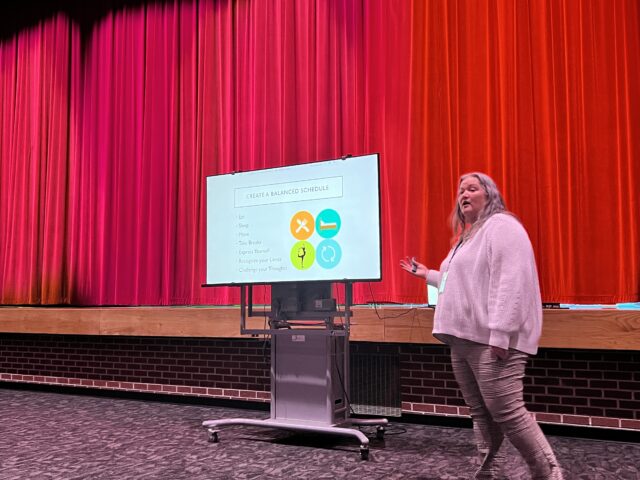Heartland school therapist Deborah Thimsen-Villa presents parents with youth mental health information in the school theater.
Two youth mental health sessions were held during Heartland’s parent-teacher conferences this Monday. Molly Woodman from The Kim Foundation was the scheduled speaker for “Encouraging Hope in Parents: A Presentation on Youth Mental Health.” At the last minute, she was unable to make it to the event, so Heartland’s school therapist, Deborah Thimsen-Villa, stepped up and spoke to the parents.
She outlined how excessive stress may affect a student’s mind and body, raising cortisol levels and resulting in many problems: anxiety, gut problems, inflammation, immune function, brain fog, and cardio issues.
“External triggers for students may be academic pressure, social stress, family discord, world events, and significant life changes. Internal triggers may be fear of failure, public speaking, trying something new, and expectations,” said Thimsen-Villa.
She emphasized the need for coping strategies and making life adjustments to avoid the effects of chronic stress. A few adjustments she recommended include a balanced schedule, adequate sleep, taking breaks, recognizing limits, and incorporating art and movement into their life.
The PRIDE technique—praise, reflect, imitate, describe, and enjoy—was explained to parents for use with their children. “Tell your kids what you like about them, say what they say, describe what they do, and relax and have fun,” said Thimsen-Villa. “Practicing this with children creates a connection, letting your kids know they are loved, heard, and you are paying attention.”
Another strategy she recommended for communicating with your kids was to use open-ended questions. One example was: “I noticed you aren’t hanging around with your friends. I wonder if something is going on?” She said these more observant and open-ended questions usually lead to better communication with your children.
“Too often, as parents, we want to fix our kid’s problems because it’s natural to want to rescue and protect them. This strategy is more about being there for them, validating their feelings but not necessarily agreeing with them. We can allow them to problem solve with help and say it’s okay to make mistakes,” said Thimsen-Villa.
She pointed out that schools are sometimes the only “safe place” some students have in their lives. As a result, it’s very important for schools to be equipped and parents to be informed about youth mental health.
Hats off to the Heartland administration for addressing mental health issues and providing resources for both parents and students.


































